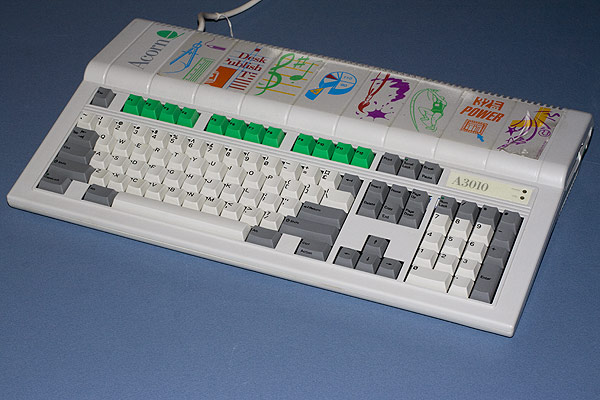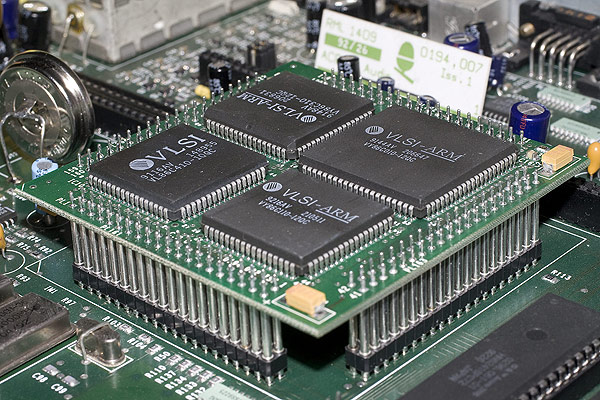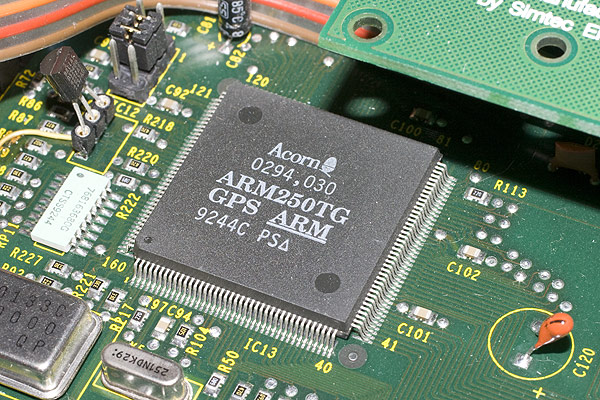Acorn A3010
The Acorn A3010 was released in 1992 and was one of two computers that were intended to replace the Acorn BBC A3000 computer. The A3010's sister machine was the A3020. The A3010 departed from the traditional Acorn colour schemes of using either orange/red or grey function keys instead sporting green function keys.

There were two major revisions of the Acorn A3010. The early version shipped before the Acorn ARM250 SOC was ready and so, Acorn used its existing ARM2 chipset mounted on a mezzanine board to provide the same functionality as the ARM250 did.

The later ARM250 based A3010's are the least expandable of all the computers that Acorn produced and many faults that could have been repaired on older machines with a simple chip replacement required a full motherboard replacement instead. This was due to the low chip count and increased difficulty in the soldering that would be required to fix the machine. It was cheaper and easier to replace the entire motherboard.
My A3010 is the later type that has an ARM250 processor fitted which rolls up the original ARM2 chipset into a single package fitted to the motherboard. These A3010's have a very low chip count on the motherboard.

There were third party memory upgrades available offering up to 4MB of RAM and a single 8-bit podule expansion was supported. Unlike the earlier Archimedes machines and the early A3010's, there was no way to upgrade the CPU to an ARM3 processor and no Acorn supported way of connecting the machine to an Econet network.
Expansions in this A3010
Battery replacement schedule
The original battery was replaced in July 2013 with a Varta MemPac 3/V150H.
The next battery change is due in July 2016.
Translate this site
Acorn Kit
Acorn A3010 Maintenance
JASSP Forums
The JASSP project run by Jon Abbott is an attempt to acquire the rights to all of the Acorn Archimedes games back catalogue and archive them for the future.
Archiving the games is just half of the battle. Jon has written ADFFS which allows those archived images to be loaded and played on any ARM based machine running RISC OS which involves patching these games to run on later hardware using a JIT/VM style environment within ADFFS to allow the games to be patched to run safely on the latest hardware.
- ADFFS • Re: ADFFS 2.80 public beta
- ADFFS • Re: ADFFS 2.80 public beta
- ADFFS • Re: ADFFS 2.80 public beta
- ADFFS • Re: ADFFS 2.80 public beta
- ADFFS • Re: ADFFS 2.80 public beta
- General • Re: Help playing games
- General • Help playing games
- ADFFS • Re: ADFFS 2.80 public beta
- ADFFS • Re: ADFFS 2.80 public beta
- ADFFS • Re: ADFFS 2.80 public beta
- ADFFS • Re: ADFFS 2.80 public beta
- General • Re: Virtual Golf
- ADFFS • Re: ADFFS 2.80 public beta
- General • Re: Virtual Golf
- ADFFS • Re: ADFFS 2.80 public beta